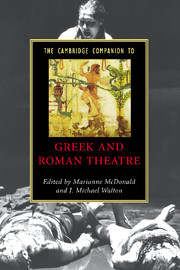Book contents
- Frontmatter
- Introduction
- PART I: TEXT IN CONTEXT
- 1 ‘Telling the tale’: a performing tradition from Homer to pantomime
- 2 Ancient theatre and performance culture
- 3 Religion and drama
- 4 The socio-political dimension of ancient tragedy
- 5 Aristotle’s Poetics and ancient dramatic theory
- 6 Politics and Aristophanes: watchword ‘Caution!’
- 7 Comedy and society from Menander to Terence
- 8 Lost theatre and performance traditions in Greece and Italy
- PART II: THE NATURE OF PERFORMANCE
- Playwrights and plays
- Glossary of Greek and Latin words and terms
- Select bibliography
- Index
4 - The socio-political dimension of ancient tragedy
from PART I: - TEXT IN CONTEXT
Published online by Cambridge University Press: 28 January 2009
- Frontmatter
- Introduction
- PART I: TEXT IN CONTEXT
- 1 ‘Telling the tale’: a performing tradition from Homer to pantomime
- 2 Ancient theatre and performance culture
- 3 Religion and drama
- 4 The socio-political dimension of ancient tragedy
- 5 Aristotle’s Poetics and ancient dramatic theory
- 6 Politics and Aristophanes: watchword ‘Caution!’
- 7 Comedy and society from Menander to Terence
- 8 Lost theatre and performance traditions in Greece and Italy
- PART II: THE NATURE OF PERFORMANCE
- Playwrights and plays
- Glossary of Greek and Latin words and terms
- Select bibliography
- Index
Summary
In this chapter I will argue that the 'socio-political dimension' of fifth-century Greek tragedy amounts to its engagement with the collective ideology and competitive ethos of the democratized classical polis on the one hand, and more traditional Homeric and mythic conceptions of religion and heroic self-assertion on the other. In addition, I will consider the Greek tragedians' interest in framing dilemmas of action with debates over the merits and meanings of certain key fifth-century socio-political concepts. I will address the pressing question of how far Greek tragedy's 'socio-politics' speak to watching Athenians and their guests from other Greek states as polis-dwellers in general as opposed to singling out the democratic aspects of the Athenian civic experience. We will see that while Greek tragedy sometimes used tales of monstrous royal goings-on and heroic extremism to highlight the civilized values of Athens, this city's democratic citizenry rarely watched a play which would not have unsettled their senses of social and political well-being. However, any claim to the effect that Greek tragedy had real socio-political 'bite' for its audience has to be tempered with a recognition that Greek tragedy's overarching mythical idiom should preclude any reading of it as a vehicle for specific messages or manifestos.
Having dealt with the case of classical Athens, I will briefly argue that the social and political force of tragedy did not diminish after the classical period. Neither the facts of Hellenistic or Roman 'appropriation' nor the paucity of available evidence should prevent us from realizing that Roman Republican tragedy spoke provocatively and productively to its audience's specific sociopolitical milieu.
- Type
- Chapter
- Information
- The Cambridge Companion to Greek and Roman Theatre , pp. 72 - 91Publisher: Cambridge University PressPrint publication year: 2007
- 1
- Cited by



